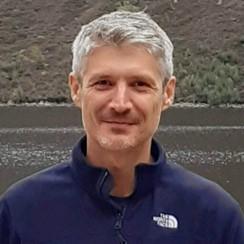Embarking on the journey
Let’s go back to where Zisis’s story began. Zisis Gagkas recalls that his journey started with a spark of curiosity - “The advertisement grabbed my attention”. Therefore, he decided to talk to previous fellows about their experience, who recommended applying. Zisis learned from them how the fellowship scheme works, its structure, and what support is available. Meanwhile, Zisis also thought about what he could bring to this fellowship.
He found that fellowships are bespoke opportunities co-constructed with key partners to deliver solutions to priority needs and he realised he was well positioned to “use spatial datasets to support land-based policies and help link science to policy”.
Intrigued, he felt the fellowship presented an opportunity to cross academic boundaries and gain a better understanding of decision making and policy implementation.
Exploring research pathways
Outside of this fellowship, Zisis works in the Scottish Government funded Strategic Research Programme, and he found that the fellowship's objectives aligned well with his drive to help with advancing scientific understanding. Therefore, he applied and was successfully awarded the fellowship after interview.
The main aim of this fellowship was to support improvements to the evaluation of land-based policies and respective decision-making. In so doing, the fellow would need to identify sources of spatially referenced data, such as digital maps, relevant to land-based policy evolution in Scotland and identify gaps in data provision and in spatial data layers which might be useful in the future. Amongst a spectrum of policy relevance, it was expected that this project would contribute evidence to support informed decision making in relation to land use change, climate change and biodiversity loss, as central components of a more resilient and inclusive Scottish economy.
Image: Scotland landscape by Sharon from Pixabay
Zisis found there is a clear potential of using spatial technologies to provide data-driven support in developing, testing, implementing, and evaluating policy options and their impacts on the environment and on rural communities. If you’d like to find out more, then you read his case study which is available here.
Overall, the fellowship acted as a catalyst, refining methodologies, broadening perspectives, and enhancing the translational capacity of research outputs.
Navigating the fellowship landscape
Zisis was really pleased at how well-informed policy makers are and how interested they were in the information he could provide. However, he also quickly became aware he needed to take “an extra effort to make the writing more accessible for policy makers” and that his writing style needed to adjust beyond purely academic and its associated jargon. “The fellowship helped with changing my approach on how to produce deliverables for non-academic audiences”.
From data immersion to carefully assessing relevant reports tailored to policymakers' needs, it was evident the fellowship addressed both a policy need and served as a professional development opportunity.
Beyond the work: The fellow behind the fellowship
Nature and the outdoors have always inspired Zisis. In his spare time, he often cycles, takes long walks and visits museums with his children. Ensuring a work-life balance is important, especially as he is embracing the joys of parenthood.
Zisis was glad to be offered a way to work more flexibly to suit his own circumstances. “During the pandemic, I often worked at home”. There are still challenges to hybrid working, although we’ve all got more used to online meetings now.
Emergence of digital technologies
Zisis believes there are many exciting prospects in the use of digital technologies for environmental research. “New digital technologies and datasets are being developed, such as in emerging remote sensing technologies. Now, from our office desk, we can use AI and cloud computing to monitor soil moisture or map burnt areas daily and at global scales. What was once considered unimaginable is now possible”.
However, Zisis feels the challenge is that linking the outputs of purely data-driven approaches with decision and policy making requires robust data interpretation by experts, and “there is a risk there are not going to be enough people with the expertise needed to carefully assess these outputs and to utilize them in both an appropriate and efficient way ”.
Providing opportunities where experts, like Zisis, can work directly with stakeholders to enable that interpretation of research data for the benefit of society, is exactly why the SEFARI Gateway fellowship scheme was created and we were delighted have him as a fellow. So, could you be our next fellow? Why not look out for our next advert at: https://sefari.scot/news.
Written by Siting Huang, who has just completed a work placement with SEFARI Gateway and is pursuing her MSc in Science Communication and Public Engagement at University of Edinburgh.
We’d also like to thank Dr Zisis Gagkas for undertaking this Fellowship, and Shivane Chawla for her help interviewing Zisis.
